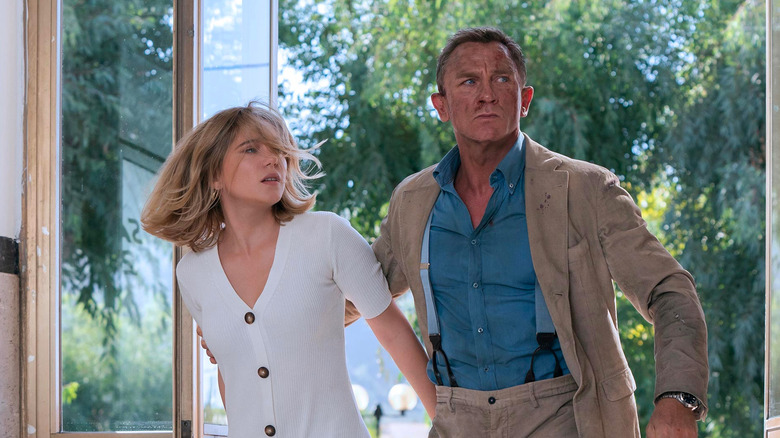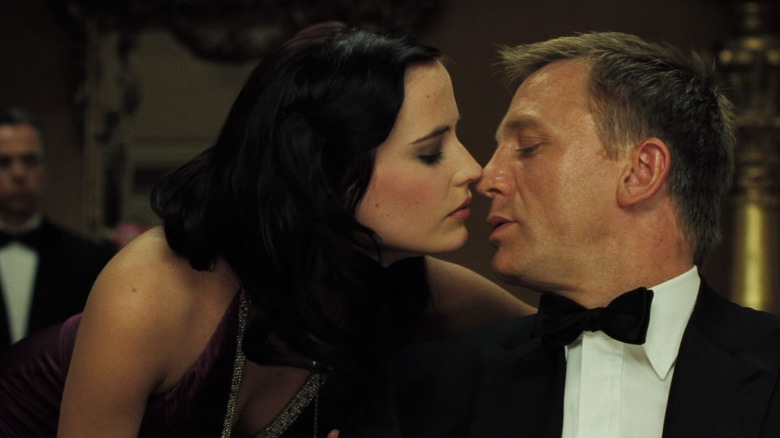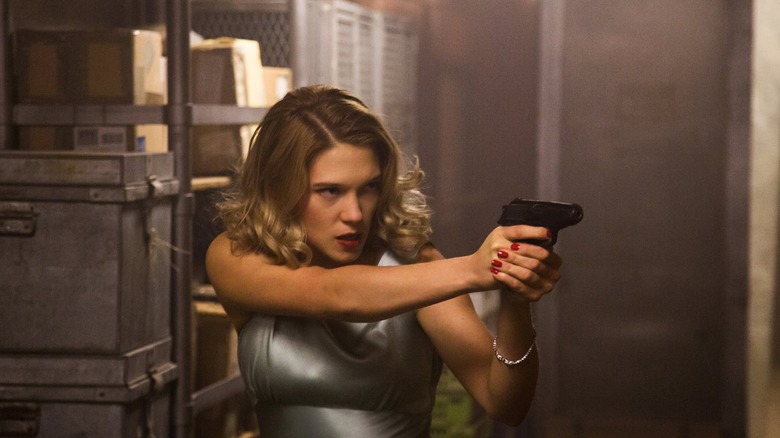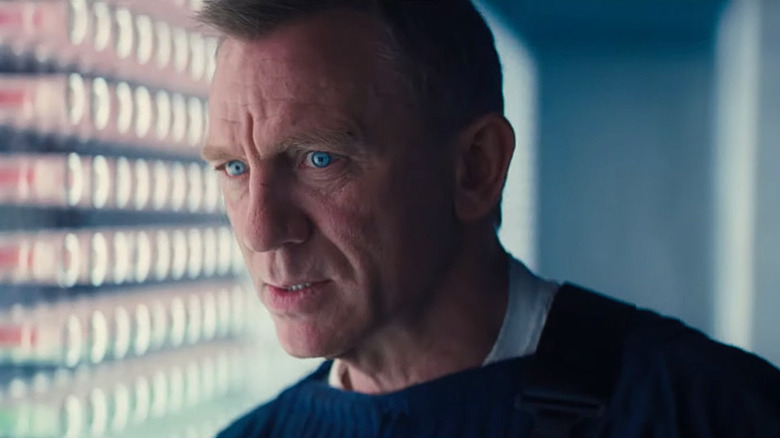
The Daniel Craig era of the James Bond franchise comes to an end this week with "No Time to Die," Craig's final time out playing 007. While I think we can all agree Craig was a damn good Bond, the series of films he leaves behind is lopsided; a clunky, often frustrating group of movies that ultimately short-changed Craig. To his credit, the actor was always up for the challenge, and did his best to inject life into his Bond films even if they were lacking. But now that Craig's time as Bond has ended, postmortems are sure to follow. Like this one you're reading right now!
Having seen "No Time to Die," I can now offer up what I think is the biggest flaw in the entire Daniel Craig James Bond era. Don't worry – I'm not going to give away spoilers for the final film, because I'm not a monster. But I also walked out of "No Time to Die" disappointed (I didn't review the film, but I recommend our review from Phil Nobile Jr.; many of Phil's thoughts match up with my own, although I think I'm more negative on the movie than he is). I have problems with the film itself, but my disappointment as a whole stems from how the entire Craig series was handled.
It Wasn't All Bad

Before we go any further, I want to make a pitstop into the land of positivity! The Daniel Craig era was not all bad. "Casino Royale" is one of the very best Bond films. "Skyfall," while far too derivative of "The Dark Knight," is highly entertaining. And the new film "No Time to Die" has several memorable scenes. Even outright disappointments like "Quantum of Solace" and "Spectre" have their moments. But overall, what I particularly loved about the Craig era is Craig's take on the character.
His debut, "Casino Royale," makes it clear that this isn't the suave, smooth-talking Bond we had grown familiar with in the Pierce Brosnan era. No, this Bond was a bruiser; a guy who is very, very good at murdering people. Sure, he looks good in a tux. But he also runs straight through solid walls as if he were the Kool-Aid Man. He's not exactly a psychopath, but as his boss M says, he is a "blunt instrument."
Craig, with his icy blue eyes and rugged face, thrived in the part. And he grew with the series, playing a more soulful, more introspective Bond than we were used to seeing. He thought about the consequences of his actions (not that it stopped him from blowing stuff up). In other words, the best thing about the Daniel Craig Bond era was Daniel Craig. (And also Eva Green's Vesper Lynd, a Bond girl with such power that she ended up haunting Bond through the entire series.)
But now, let's get into the problems that plagued the series. Or, more accurately, one big problem that caused a bunch of smaller problems along the way.
One Long Adventure

While the Bonds of yesterday had recurring characters and themes, for the most part, they were stand-alone movies. There was a time where, if you went to see a new Bond movie without having seen the previous entry, you'd be perfectly fine. Each adventure worked as a contained story. But the Craig era inexplicably changed that, and it hurt the series as a whole. The Craig series started right before the Marvel Cinematic Universe made interconnected, serialized blockbuster movie storytelling hugely popular all over again, so perhaps the producers were reading the tea leaves and realizing which way the winds were changing when they landed on this decision. Perhaps not. But no matter the reason, the results were flawed.
The Craig era can be seen as one long adventure, with each film leading into the next. Indeed, the only two films that feel like they sort of stand on their own are "Casino Royale" and "Skyfall." But "Quantum of Solace" is a continuation of "Casino Royale." And "Spectre" is primarily a follow-up to "Skyfall," with "No Time To Die" serving as a full-blown follow-up to "Spectre." While the concept of a big, interconnected Bond series isn't an abominable idea, it ultimately failed to work for the Craig series.
For one thing, the series remained stubbornly committed to its continuity – and it didn't have to. The Bond franchise by its very nature should've allowed the filmmakers to ditch the things that didn't work and start fresh. Instead, they doubled-down. "Spectre" is regarded as a major disappointment, and yet "No Time To Die" refuses to let that movie fade from our memories. Christoph Waltz's Blofeld is back, and so is Léa Seydoux's Madeleine Swann, and this is perhaps the biggest blunder of all.
For reasons I will never understand, the Craig films want us to think that Bond and Madeleine are something akin to soul mates. They belong together, the franchise tells us. Other than Vesper, who is dead, Madeleine is the only woman Bond has ever loved, at least according to "No Time To Die." And look, while no one can deny that Daniel Craig and Léa Seydoux are very attractive people, they have absolutely zero chemistry together. And while I'm not the type of person who immediately cries foul regarding May-December romances, the 17-year age difference between the two is jarring, especially because Craig seems even older when he's acting alongside Seydoux. The age difference could perhaps be excused in "Spectre" where its implied that Bond is a semi-father-figure to Madeleine, who has her fair share of daddy issues. But "No Time To Die" wants us to forget about that and just buy into the Bond/Madeleine romance. And I'm sorry, I won't. Because it doesn't work.
Old Man Bond

Let me clear something up here: I am not calling Daniel Craig "old." At 53 he's in better shape than I've ever been in my entire life, and he's still able to perform stunts and kick ass up on screen. But the problem with making Craig's Bond films all interconnected seriously affected Bond as a character, because a recurring theme in these films is that Bond is over-the-hill. This is particularly jarring since the "Bond is washed-up" angle started in "Skyfall" which was only Craig's third outing as 007.
We had just gotten to meet this guy when suddenly the films told us he was old and run-down. He keeps quitting MI6 again and again because he's just so damn tired. And it didn't have to be this way. But fully committing to the interconnected film idea, the series backed itself into a corner. By shackling itself to a clear timeline that kept moving forward, Bond's aging had to be acknowledged in ways previous Bonds never had to contend with.
Again and again, it seemed like the biggest problems that plagued the Craig Bond series could've been fixed if there hadn't been such a stubborn instance on making each of these films lead into the next. Whenever the Bond series is relaunched – and it will be, of course – I hope they jettison this concept and go back to the old days of standalone adventures.
Read this next: The 10 Most Essential Episodes Of 'Star Wars Rebels'
The post The Biggest Problem With The Daniel Craig James Bond Era appeared first on /Film.
from /Film https://ift.tt/3mwPd0G
